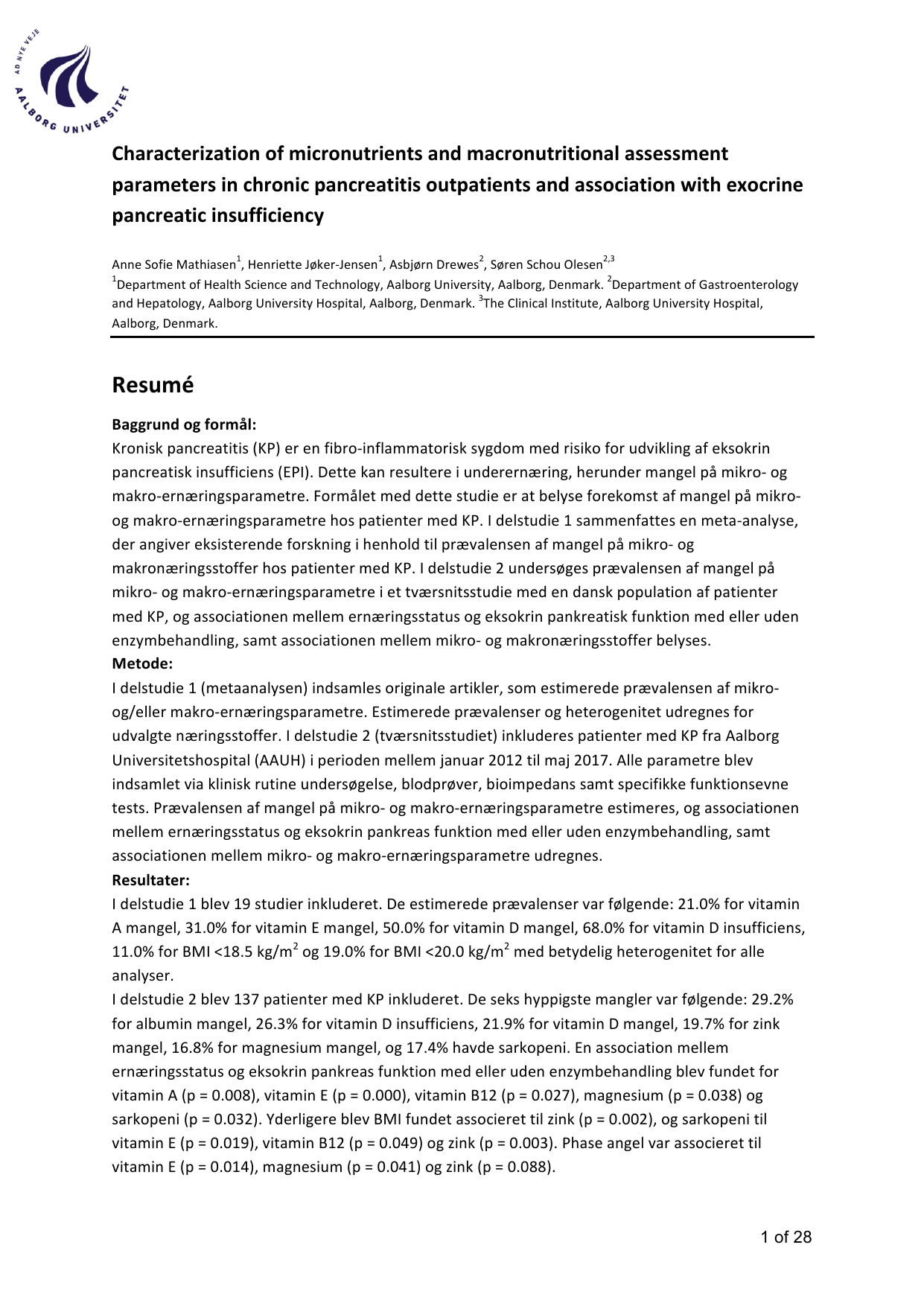
Characterization of micronutrients and macronutritional assessment parameters in chronic pancreatitis outpatients and association with exocrine pancreatic insufficiency
Term
5. Term (Master thesis)
Education
Publication year
2020
Submitted on
2020-01-02
Pages
28
Abstract
Baggrund og formål: Kronisk pancreatitis (KP) er en fibro-inflammatorisk sygdom med risiko for udvikling af eksokrin pancreatisk insufficiens (EPI). Dette kan resultere i underernæring, herunder mangel på mikro- og makro-ernæringsparametre. Formålet med dette studie er at belyse forekomst af mangel på mikro- og makro-ernæringsparametre hos patienter med KP. I delstudie 1 sammenfattes en meta-analyse, der angiver eksisterende forskning i henhold til prævalensen af mangel på mikro- og makronæringsstoffer hos patienter med KP. I delstudie 2 undersøges prævalensen af mangel på mikro- og makro-ernæringsparametre i et tværsnitsstudie med en dansk population af patienter med KP, og associationen mellem ernæringsstatus og eksokrin pankreatisk funktion med eller uden enzymbehandling, samt associationen mellem mikro- og makronæringsstoffer belyses. Metode: I delstudie 1 (metaanalysen) indsamles originale artikler, som estimerede prævalensen af mikro- og/eller makro-ernæringsparametre. Estimerede prævalenser og heterogenitet udregnes for udvalgte næringsstoffer. I delstudie 2 (tværsnitsstudiet) inkluderes patienter med KP fra Aalborg Universitetshospital (AAUH) i perioden mellem januar 2012 til maj 2017. Alle parametre blev indsamlet via klinisk rutine undersøgelse, blodprøver, bioimpedans samt specifikke funktionsevne tests. Prævalensen af mangel på mikro- og makro-ernæringsparametre estimeres, og associationen mellem ernæringsstatus og eksokrin pankreas funktion med eller uden enzymbehandling, samt associationen mellem mikro- og makro-ernæringsparametre udregnes. Resultater: I delstudie 1 blev 19 studier inkluderet. De estimerede prævalenser var følgende: 21.0% for vitamin A mangel, 31.0% for vitamin E mangel, 50.0% for vitamin D mangel, 68.0% for vitamin D insufficiens, 11.0% for BMI <18.5 kg/m2 og 19.0% for BMI <20.0 kg/m2 med betydelig heterogenitet for alle analyser. I delstudie 2 blev 137 patienter med KP inkluderet. De seks hyppigste mangler var følgende: 29.2% for albumin mangel, 26.3% for vitamin D insufficiens, 21.9% for vitamin D mangel, 19.7% for zink mangel, 16.8% for magnesium mangel, og 17.4% havde sarkopeni. En association mellem ernæringsstatus og eksokrin pankreas funktion med eller uden enzymbehandling blev fundet for vitamin A (p = 0.008), vitamin E (p = 0.000), vitamin B12 (p = 0.027), magnesium (p = 0.038) og sarkopeni (p = 0.032). Yderligere blev BMI fundet associeret til zink (p = 0.002), og sarkopeni til vitamin E (p = 0.019), vitamin B12 (p = 0.049) og zink (p = 0.003). Phase angel var associeret til vitamin E (p = 0.014), magnesium (p = 0.041) og zink (p = 0.088). 1 of 28 Konklusion: I delstudie 1 blev der fundet en stor heterogenitet mellem studierne for de fleste af de eksisterende estimater for mangel på mikro- og makro-ernæringsparametre hos patienter med CP. I delstudie 2 med den danske befolkning var prævalensen af mangel på mikro- og makro-ernæringsparametre lavere sammenlignet med estimaterne fra den eksisterende litteratur. Der var ingen klar association mellem ernæringsstatus og eksokrin pankreatisk funktion med eller uden enzymbehandling for de fleste ernærings parametre. Desuden var associationen mellem mikro- og makro- ernæringsparametre generelt ringe, men der blev fundet en stærk korrelation mellem zink og alle makro-ernæringsparametrene, og yderligere forskning indenfor dette område er nødvendigt.
Background and aims: Chronic pancreatitis (CP) is a fibro-inflammatory disease with risk of developing exocrine pancreatic insufficiency (EPI) resulting in malnutrition. Substudy 1 (meta-analysis) aims to outline the pooled prevalence of micronutritional deficiencies and macronutritional abnormalities among CP outpatients. Substudy 2 (cross-sectional study) investigates prevalence of the micronutritional deficiencies and macronutritional abnormalities in a cross-sectional study of a Danish population of CP outpatients, and examines the association between nutritional status, EPI and/or PERT, and the association between micronutrients and macronutritional assessment parameters in CP outpatients. Methods: In substudy 1, original articles reporting prevalence estimates on deficiencies were collected. Pooled prevalences and heterogeneity of selected nutrients were calculated. For substudy 2, outpatients with CP from AAUH were enrolled between January 2012 through May 2017. Assessments were collected through routine clinical examination, blood samples, bioelectrical impedance, and specific functional tests. Prevalences of deficiencies were estimated, and the association between nutritional status, EPI and/or PERT, and association between micronutrients and macronutritional assessment parameters were calculated. Results: For substudy 1, pooled prevalences were: 21.0% for vitamin A deficiency, 31.0% for vitamin E deficiency, 50.0% for vitamin D deficiency, 68.0% for vitamin D insufficiency, 11.0% for BMI <18.5 kg/m2, and 19.0% for BMI <20.0 kg/m2 with noteworthy heterogeneity. In substudy 2, 137 patients with CP were enrolled. Most frequent deficiencies were: 29.2% for albumin deficiency, 26.3% for vitamin D insufficiency, 21.9% for vitamin D deficiency, 19.7% for zinc deficiency, 16.8% for magnesium deficiency, and 17.4% had sarcopenia. An association to EPI and/or PERT were found for vitamin A (p = 0.008), vitamin E (p = 0.000), vitamin B12 (p=0.027), magnesium (p = 0.038), and sarcopenia (p = 0.032). BMI was associated with zinc (p = 0.002). Sarcopenia was associated with vitamin E (p = 0.019), vitamin B12 (p = 0.049), and zinc (p = 0.003). Phase angel was associated with vitamin E (p = 0.014), magnesium (p = 0.041), and zinc (p = 0.088) Conclusion: For substudy 1, a large heterogeneity was shown between studies for most of the existing estimates on malnutrition in patients with CP. For substudy 2, the prevalence of malnutrition seem lower in Danish outpatients with CP compared to the estimates provided from the existing literature. There are no clear association between malnutrition and the presence of EPI and use of PERT for most nutritional parameters. Also the 2 of 28 association between micronutrients and macronutritional assessment parameter are generally poor, but a strong correlation between zinc and macronutritional assessment parameters was found, and requires more investigation.
Keywords
Documents
